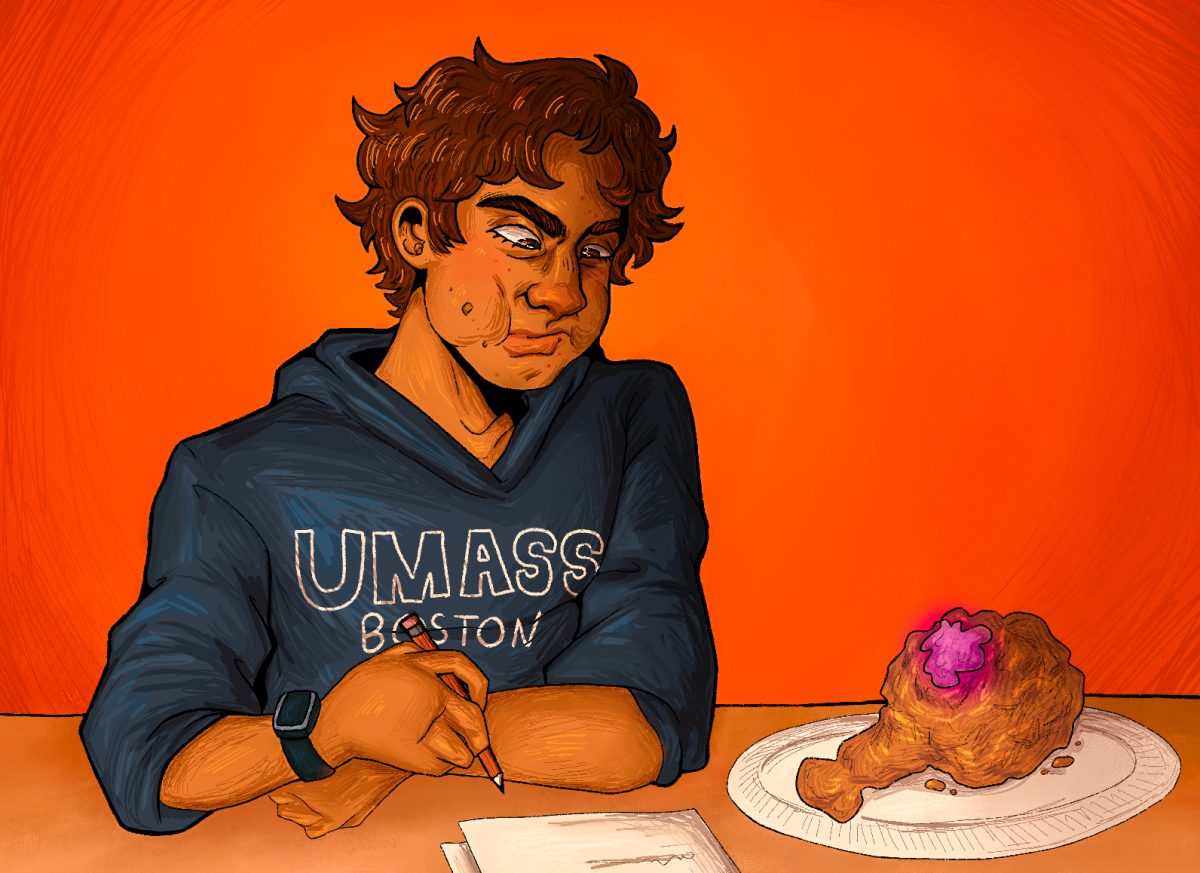For any UMass Boston student living in the dorms, eating in the Dining Hall twice a day is a staple. They usually have an assortment of options—except on the weekends—such as pizza, stir fry and some type of mystery meat marinated in a brownish sauce. However, out of these several forms of sustenance, the true problem is that the chicken is rarely ever white in the middle. Now, I like my steak medium rare, and I’m not trying to participate in a race war here, but I will not accept chicken that is anything but white all the way through. Is that too much to ask?
It’s seemingly common knowledge that undercooked chicken can be very dangerous to consume. Salmonella is notorious for making you spew out of both ends, hospitalizing you and just overall making you feel like death. However, no one has really dove into the aftereffects of salmonella poisoning…until now.
The university’s best biochemists and psychologists have banded together in these trying times to determine what in tarnation is going on. Besides the obvious motivation of trying to stop salmonella, the scientists also took interest in some of the odd traits exhibited by the poisoned students. They noticed that everyone who ate in the Dining Hall became violently ill, but after their recovery, they returned to their classes as academic all-stars.
Yes, there are several students currently in comas because of the Korean BBQ chicken thighs served to the right of the pasta, but at this point, we really just gotta cut our losses and ditch the kids.
“You gotta spend money to make money, ya know?” said one professor, Dr. Amy Jakowski. “After the students vomit so violently that they meet Jesus, man, do they absolutely crush those exams!”
Before any academically positive discoveries were made, I interviewed one of the managers of the Residential Dining Hall, Kevin Donaldson, asking him why on God’s green Earth they would serve undercooked chicken to the students. I mean, there has got to be someone back there who looks into the tray and thinks, “Hmm, these chicken thighs might need a few more minutes.”
Donaldson hesitated for a moment before replying, “Hey, it’s not our fault the kids eat it. If it’s pink, it’s pink. Who doesn’t like medium rare chicken?” His tone was calm. Too calm. I could have interpreted this response one of two ways: He knew something about the academic abilities that salmonella provides and was playing up the “mentally lost” role for the bit, or he was genuinely an idiot. At the time, I believed the latter, but as more was unveiled, the former seemed closer to the truth.
The Psychology Department ran a three-week-long study, led by Dr. Jakowski, where they had 100 freshmen eat undercooked chicken patties and adobo chicken legs as their dinner for three consecutive days. At least, three was the plan. Only half of the students made it back for day two, and by day three, 60 kids were found passed out on various campus toilets, 30 were out the door of University Health Services, nine were unconsciously strewn about the new quad, and the one remaining was Augustus Freidlander.
He had the iron stomach of a goat. This isn’t a metaphor; he literally had a goat’s stomach. As a young child back in Germany, he required life-saving surgery due to being born without a stomach lining. The best the doctors could do at the time was give him a goat stomach as a temporary fix. However, the replacement quickly became permanent, and it has provided him protection from a plethora of dangerous food and bacteria. Salmonella was light work for this guy.
Anyway, back to the other 99 deathly ill people. It took a couple of weeks to get everyone grounded again, but luckily, there were no official casualties. The students were all excused from the work that they missed while they were fighting for their lives. This is where things started to kick in. 75 percent of the students from the experiment were more focused, punctual, attentive and scored extremely well on their exams. These weren’t even the smart kids! I know this because the actual smart students would not have subjected themselves to salmonella in the first place. Anyhow, these numbers were striking! The students reported that they had never felt more alive and that they actually wanted to learn!
So what was learned from this controlled fiasco? Is getting food poisoning and seeing the light really worth a few extra points in your economics class? Maybe, but why be uncertain? Tap your ID at the Dining Hall and go nuts! What’s the worst that could happen? You either contract salmonella and achieve the GPA of your dreams, or just get crossed on Adderall, nicotine and alcohol like every other college student.





















































